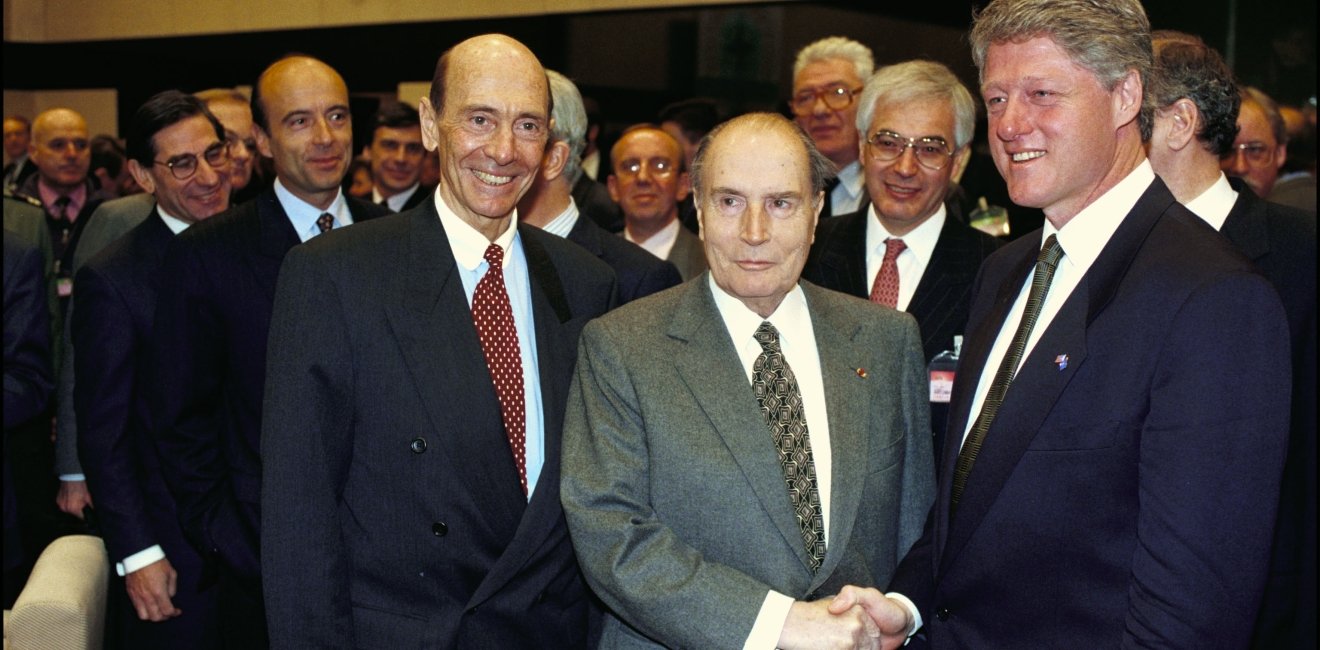The Helmut Kohl Transcripts: NATO Enlargement
How Helmut Kohl tried to navigate two goals that often conflicted with each other: fostering engagement with Russia and expanding the NATO alliance in the 1990s.

A blog of the History and Public Policy Program
How Helmut Kohl tried to navigate two goals that often conflicted with each other: fostering engagement with Russia and expanding the NATO alliance in the 1990s.

This essay is one in a series about the Helmut Kohl Transcripts, a new Wilson Center Digital Archive resource featuring hundreds of Helmut Kohl’s foreign policy meetings with world lead
Explore the helmut kohl transcripts
In March 1993, German Defense Minister Volker Rühe became the first Western policymaker to publicly make the case for NATO enlargement.
In his Alastair Buchan Memorial Lecture at the International Institute for Strategic Studies in London, Rühe emphasized that Poland, Hungary, and the Czech Republic wanted the same sense of security that their Western neighbors enjoyed through the North Atlantic Treaty Organization. The nations of Europe would not be able to establish or sustain a common market, Rühe added, without a shared obligation to defend one another.
Rühe had not consulted German Chancellor Kohl on the content of his speech beforehand. Perhaps this was because Kohl approached the issue of NATO enlargement more cautiously than Rühe. “Helmut Kohl could not be as forward-leaning as I was. That was clear,” Rühe later recalled. When Central and East European policymakers asked for NATO membership, Kohl was non-committal. In the spring of 1993, for instance, Kohl deflected an appeal by Czech President Vaclav Havel for rapid NATO association. “One had to keep this question in mind,” is all Kohl would say about the matter.
When it came to Europe’s security architecture, expanding the alliance was of secondary concern to Kohl. At the time, Kohl’s primary concern was to support Russia’s democratic reforms and Russia’s integration into the Western led order. The challenge for the West, Kohl felt, was to push NATO enlargement along carefully and slowly in order to buy time for the emergence of a lasting partnership with Russia.
Periodically, Kohl confessed that it would be tough for the West to achieve both goals. In a September 1993 telephone conversation with President Clinton, Kohl recognized that the Czech Republic, Hungary, and Poland had real security concerns, but explained to Clinton that he “did not know whether it was feasible at all to contemplate NATO enlargement at the current point in time.” According to the notes of the phone call, Kohl “had doubts” about admitting these countries into the alliance. “Perhaps one could find a temporary solution for an indefinite time in order to satisfy their needs.”
The purpose of the “temporary solution” was to put both Russia and the aspiring candidates for NATO membership at ease.
NATO’s Partnership for Peace (PfP) – a mechanism to promote cooperation with non-NATO countries in Europe – emerged as a potentially promising way to move forward. NATO would open and enlarge at some point in the future, but PfP put enlargement at the end, rather than the beginning, of a long-term process. PfP would also not extend NATO Article 5 guarantees relating to collective defense to potential new members. Its focus was on practical cooperation with aspiring new NATO members states, including military-to-military cooperation, defense policy, and planning and joint military exercises. Moreover, PfP promised to buy additional time for the stabilization of the NATO-Russia relationship and the search for a new post-Cold War security architecture.
When the PfP approach began in January 1994, it was not clear whether or not this framework would actually work. Kohl’s concern was that the Czechs, the Poles, the Hungarians, and others would lose patience and demand immediate accession to NATO, particularly if tensions between Russia and Ukraine escalated.
Bill Clinton and Kohl discussed such a potential scenario in late January 1994. “If there was a backlash…a tendency for Ukraine’s return to Russia,” Clinton warned, “then we would be faced with the collapse of the entire theory of the NATO summit [of January 1994].” He continued to explain that Ukraine was “key for the entire developments in Central and Eastern Europe. If anything happened in Ukraine, this would increase the pressure for the NATO accession of the Central and Eastern European countries.”
Kohl agreed. “It was important to maintain Ukraine’s sovereignty and to support the country,” he responded. “One must not just focus on Moscow and forget Ukraine. Ukraine also had its honor and its dignity which one ought to respect.”
In the years to come, Kohl was a key figure in the evolution of NATO’s partnership with Russia. Time and again, Kohl tried to reassure Boris Yeltsin that NATO enlargement was guided by three premises: no surprises, no rush, and no exclusions. Kohl’s core belief was that stability and security in Europe could not be achieved without or against Russia.
As of 1995, it seemed that Yeltsin was beginning to accept NATO enlargement as a reality. He was simultaneously trying to prevent it from happening, while also trying to find a way for Russia to live with enlargement and to define the context in which it would take place. Although Yeltsin told Kohl in May 1995 that “it seems that NATO was creeping up closer to Russia’s borders” and that “this was not acceptable,” he also asked that NATO avoid making any decisions regarding enlargement prior to the 1995 Duma elections and the 1996 Presidential election. In other words, if Yeltsin could not derail the enlargement process entirely, he at least wanted to avoid the worst political costs.
Kohl signaled his understanding for Yeltsin’s position. “Currently, it was just about the ‘how,’ later it would be about the ‘when’ and ‘who,’” Kohl explained. The German Chancellor was sympathetic to Yeltsin’s fraught political position.
In February 1996, Russia’s new Foreign Minister Yevgeny Primakov told Kohl that the Russian side “wanted to have a pause in the discussions on NATO enlargement. This would enable the search for a consensual solution.”
Kohl did not agree with the motion to table NATO enlargement all together, but once again he did show sensitivity to Russia. “We must not lead this discussion in public, especially at this point in time,” Kohl responded. “Both sides had to develop more understanding of each other.
In the context of NATO enlargement, Kohl put emphasis on NATO’s emerging partnership with Russia, which was codified in the NATO-Russia Founding Act on Mutual Relations, Cooperation and Security of May 1997. NATO and Russia did not consider one another adversaries given the wide-ranging transformations since the end of the Cold War. In April 1997, Kohl told Yeltsin that “we are at the beginning of a long-term process in which mutual trust should grow. Russia should therefore put the positive development of the NATO/Russia relationship in the foreground.”
Kohl anticipated that Russia’s opposition to NATO enlargement would not disappear. He also sensed the risk of a potential resurrection of nationalism and imperialism in Russia. Given the country’s uncertain future, Kohl was determined to maintain his engagement with Russia. “He was trying to help involve Russia and at the same time support the reform process. He could not make a forecast. But if you did not help, the risk was greater.”


A leader in making key foreign policy records accessible and fostering informed scholarship, analysis, and discussion on international affairs, past and present. Read more



